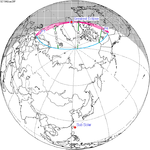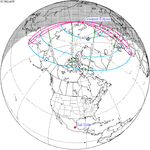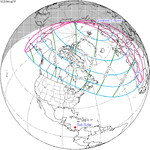Solar eclipse of October 16, 2126
| Solar eclipse of October 16, 2126 | |
|---|---|
| Type of eclipse | |
| Nature | Total |
| Gamma | 0.8345 |
| Magnitude | 1.0534 |
| Maximum eclipse | |
| Duration | 240 s (4 min 0 s) |
| Coordinates | 45°18′N 58°36′E / 45.3°N 58.6°E |
| Max. width of band | 319 km (198 mi) |
| Times (UTC) | |
| Greatest eclipse | 9:12:51 |
| References | |
| Saros | 155 (12 of 71) |
| Catalog # (SE5000) | 9793 |
A total solar eclipse will occur on October 16, 2126. A solar eclipse occurs when the Moon passes between Earth and the Sun, thereby totally or partly obscuring the image of the Sun for a viewer on Earth. A total solar eclipse occurs when the Moon's apparent diameter is larger than the Sun's, blocking all direct sunlight, turning day into darkness. Totality occurs in a narrow path across Earth's surface, with the partial solar eclipse visible over a surrounding region thousands of kilometres wide.
Visibility
The eclipse will cross Europe and Central Asia and will be visible in Norway, Sweden, Finland, Estonia, European part of Russia, Kazakhstan, Uzbekistan, Kyrgyzstan, Tajikistan and China.
For Moscow it will be the next total eclipse after the 1887 eclipse (which was in the northern part of city).[1] Other large cities in the total phase of eclipse include Umeå, Tampere, Helsinki, Narva, Saint Petersburg, Tver, Ryazan, Saratov, Atyrau, Tashkent and Kashgar.[2]
Saros 155
It is a part of Saros cycle 155, repeating every 18 years, 11 days (223 synodic months), contains 71 events. The series started with a partial solar eclipse on June 17, 1928. It has total eclipses from September 12, 2072 to August 30, 2649. The series also has 3 hybrid eclipses from September 10, 2667 to October 3, 2703 and 20 annular eclipses from October 13, 2721 to May 8, 3064.
The series ends at member 71 as a partial eclipse on July 24, 3190. The longest total eclipses will be on October 26, 2144 and on November 6, 2162, at 4 minutes and 5 seconds.[3]
| Series members 1–10 occur between 1901 and 2100: | ||
|---|---|---|
| 1 | 2 | 3 |
 June 17, 1928 |
 June 29, 1946 |
 July 9, 1964 |
| 4 | 5 | 6 |
 July 20, 1982 |
 July 31, 2000 |
 August 11, 2018 |
| 7 | 8 | 9 |
 August 21, 2036 |
 September 2, 2054 |
 September 12, 2072 |
| 10 | ||
 September 23, 2090 | ||
References
- ^ Энциклопедия для детей [Encyclopedia for children] (in Russian). Vol. 8. Астрономия [8. astronomy]. Moscow: Аванта+. 1998. p. 292. ISBN 5-89501-016-4.
- ^ Map of Total Solar Eclipse on October 16, 2126
- ^ Saros Series Catalog of Solar Eclipses NASA Eclipse Web Site.




